| 1st Day of Three-Day International Conference on ‘’Significance of the Belt & Road Initiative in Regional Connectivity’’ at University of the Punjab, Lahore, jointly organized by Regional Integration Center, University of the Punjab, Lahore & Embassy of the People’s Republic of China to Pakistan |
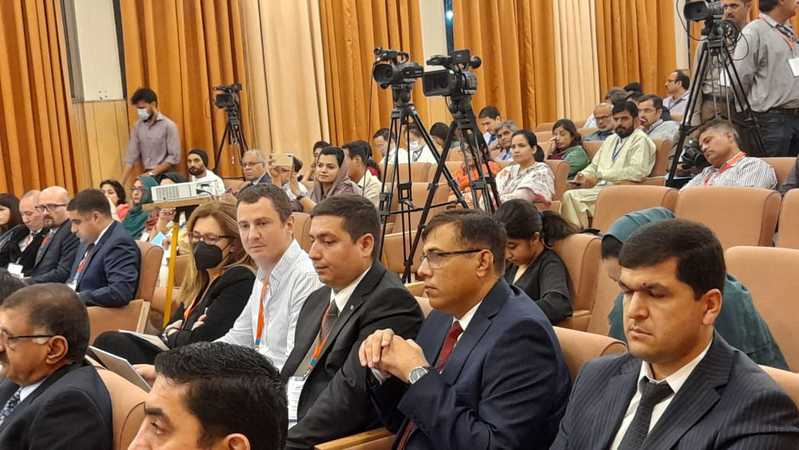
July 6th, 2022
INAUGURAL SESSION
The Inaugural Session of Three-day International Conference on ‘’Significance of the Belt & Road Initiative in Regional Connectivity’’ at University of the Punjab, Lahore was held. The conference is jointly organized by Regional Integration Center, University of the Punjab, Lahore & Embassy of the People’s Republic of China to Pakistan.
The conference will establish an extensive link between regional stakeholders and enhance people-to-people interactions for the understanding of the significance of regional cooperation through BRI. It will also prove to be a great venture to formulate a future road map under BRI for the legal framework. Panelists and experts from the Eurasian region, BRI partner countries, and Pakistan participated in the conference.
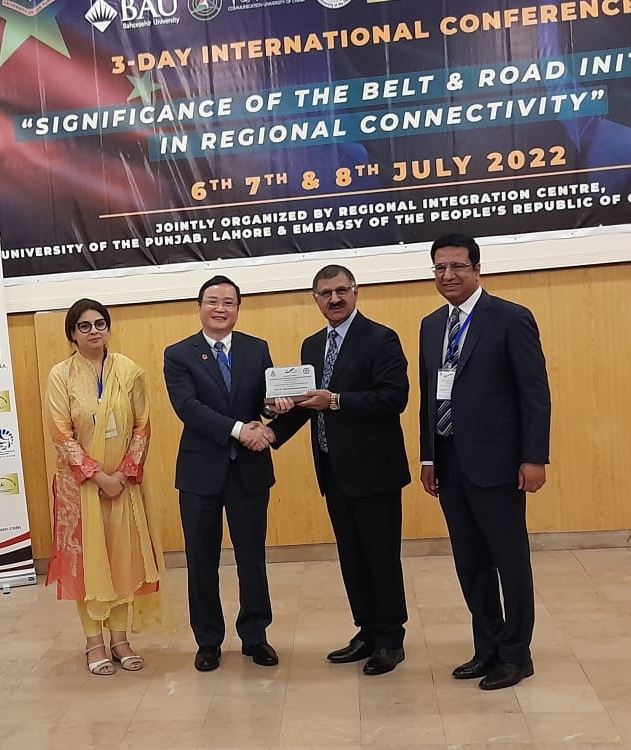
The Inaugural session was moderated by Dr. Fouzia Hadi Ali, Director, Regional Integration Centre. She warmly welcomed the national and international prominent guest speakers from different institutions. She highlighted the concept of cooperation and regional connectivity under BRI since this endeavor would bring prosperity to the area.
Dr. Mahboob Hussain, Chairman, Department of History, University of the Punjab, Lahore gave welcome address. He stated that it is an honor that University of Punjab has been chosen as the venue for this grand international conference. He appreciated the idea of cooperation as this act could lead to prosperity in the region. He also stated that the conference has been organized to deliberate upon the ways and means for exploring themes of regional connectivity, with particular reference to BRI.
Dr. Iram Khalid Chairperson, Department of Political Science, University of the Punjab, Lahore discussed major themes and characteristics of the 3-day international conference. She stated that such joint ventures will enhance people-to-people contacts at national and international level.
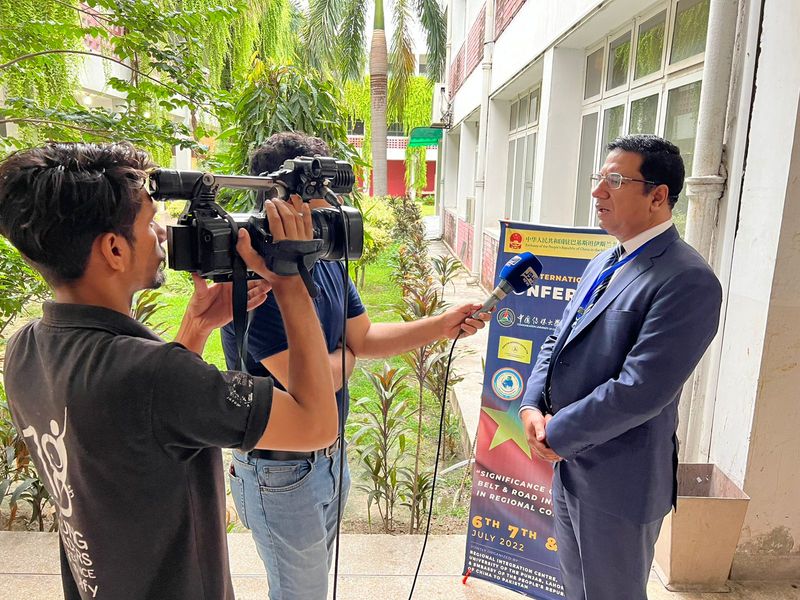
Mr. Khalid Taimur Akram, Executive Director, Pakistan Research Center for a Community with Shared Future (PRCCSF), Communication University of China (CUC), Beijing, China presented his analysis on the concept of Community with Shared Future. He explained that the idea given by the President Xi Jinping in 2013 would materialize through this conference. He recognized the efforts of all collaborative partners in organizing this biggest event of the year.
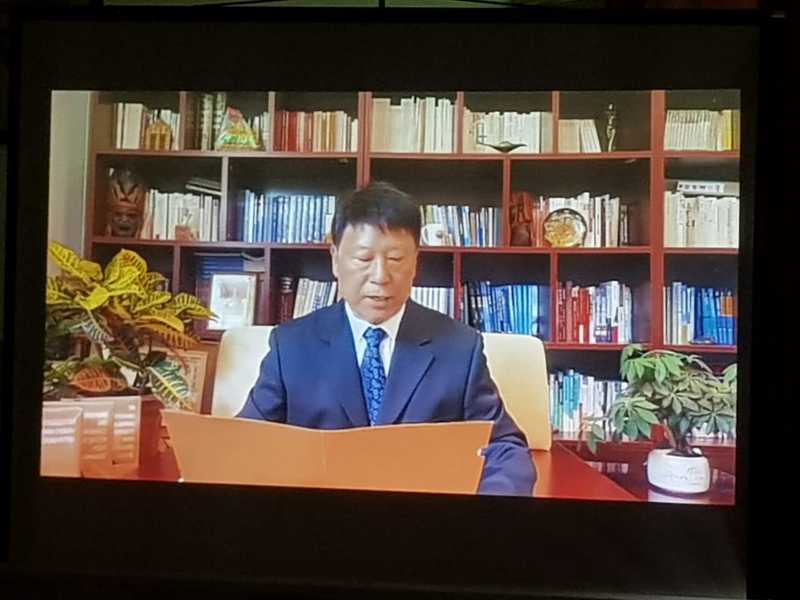
A video message by Prof Li Huailiang, Dean, Institute for a Community with a Shared Future, Communication University of China, Beijing, China was played for the audience. He welcomed the idea of international conference and hoped that the experts from various states will discuss prospects of cooperation under BRI. He also expressed his gratitude to all organizers of the conference. He also highlighted the robust role of China in enhancing cooperation among BRI states.
Prof. Dr. Hassan Askari Rizvi Professor Emeritus Department of Political Science and Former Chief Minister of Punjab gave keynote speech on the significance of BRI project. He referred to the rapid shift from the West to East due to the CPEC. He stated that we have multiple powers in the world instead unipolarity. He also discussed that CPEC has potential to expand, competitiveness and security to this region. He concluded by suggesting that Pakistan should speed up the work on CPEC so that it would be able to attain maximum benefits.
Mr. Hassan Daud Butt, CEO at the Khyber Pakhtunkhwa Board of Investment & Trade (KP-BOIT) expressed his views on BRI covering China, Pakistan and Central Asia. He stated that this project will establish new regional links. He stated that BRI project is a beacon of hope and Pakistan can only be able to extract maximum benefits if it tactfully played its role amid global environment. He proposed a model based on Pakistan-China-Turkey partnership keeping in view the idea of regional connectivity.
Mr. Sarmad Ali, President, All Pakistan Newspaper Association (APNS) discussed the need of true media platform between China and Pakistan. He stated that the media is a major driving force in the global arena and it can bring together the people of diverse background. He was of the view that modern wars are being fought on media. So, it is the responsibility of the media of all regional states to remove the atmosphere of doubt and promote trust.
Prof. Mehmet Seyfettin Erol President of Ankara Center for Crisis and Policy Studies (ANKASAM), Turkiye was the Guest of honor. He drew the attention of audience to the emergence of China as the rising country in South Asia. He also supported the general idea of developing corridors for the economic growth with special reference to CPEC. In addition to this, he took the opportunity to explain the idea of Middle Corridor being executed by the Turkish government with the vision of enhancing regional cooperation. We share shoulder with Pakistan.
Rear Admiral Shifaat Ali Khan SI (M) President Maritime Center of Excellence (MCE) / Commandant Pakistan Navy War College, Lahore was the chief guest. He expressed the importance of the freedom of seas. He stated that it is a high time to shift our attentions towards Maritime domain in order to materialize the concept of regional connectivity. He stated that Pakistan is doing best to address the maritime challenges and has potential to transform the region.
Prof. Dr. Shahid Munir, Chairman Punjab Higher Education Commission thanked all the collaborative partners of the conference. He stated that though BRI is viewed as an infrastructural project, but it is going to build socio-economic and cultural linkages between Pakistan and China. He presented the idea that Pakistan should seek economic help from China and take the possible measures to attract Chinese investment.
Mr. Zhao Shiren, Counsel-General, Chinese Consulate-General in Lahore thanked and appreciated all those eminent figures who shared their views in the conference. He focused on the significance of BRI and how it can transform the economy of Pakistan. He stated that it is opening new ways for not only Pakistan, but also for regional countries. He also shared his view that the Chinese government is not merely confined to the infrastructural development, but also aiming to the exchange of shared culture between China and Pakistan.
Prof. Dr. Muhammad Saleem Mazhar Conference Patron & Vice Chancellor, Universityof the Punjab stated that we should put CPEC on fast track because of the negative propaganda by the international media and increasing confusions. Apart from the governments of both countries, he emphasized on the dire need of collaboration and exchange of scholars to create a discourse of friendship between China and Pakistan.
At the end of inaugural session, shields were given to the distinguished guests of the conference.
WORKING SESSION 1
Presentations by Visiting Foreign Experts / Scholars
A working session on “Prospects for Cooperation under Belt & Road Initiative and Significance of Regional Connectivity” was held. The speakers in the working session were the visiting foreign experts and scholars. This session aimed to highlight the various ways of cooperation and coordination by the international stakeholders of the Belt and Road Initiative project as envisioned by President Xi in 2013. The session was presided by Prof. Dr. Zafar Nawaz Jaspal, School of Politics & IR, Quaid-e-Azam University, Islamabad. The session was attended by government dignitaries, foreign experts, and leading national academia and students.
Prof. Dr. Zafar Nawaz Jaspal, School of Politics & IR, Quaid-e-Azam University, Islamabad commenced the session by his welcome remarks. He emphasized the geo-strategic and the geo economic perspective should be taken into consideration.
The working session commenced with the speech of Dr. Kamran Yusif oglu Eyyubov, Head of the Department of Finance and Management, Baku State University, Azerbaijan. His topic was the post conflict opportunities in Azerbaijan to join the BRI. He thanked the government of Pakistan to help his country to survive the recent conflict in the Karabakh region. He showed his deep interest to join the BRI. He discussed about Zangezur Corridor in Azerbaijan which could be beneficial for the BRI.
Mr. Adil S. Kaukenov, Chief Research Fellow, Kazakhstan Institute of Strategic Studies under President Office, Head of Center for Chinese Studies, Kazakhstan stated that BRI will tremendously benefit the Caucasus and the Central Asian states. This new Silk Road will be a giant step in the right direction of economic prosperity. Although there is skepticism but the reality of sincerity by the stakeholders is stronger. The main BRI highway passes right from the middle of Kazakhstan; therefore, the country has high stakes in this grand project.
Mr. Moldaliev Melis Almazbekovich, Counsellor, Kyrgyz Republic Embassy to Pakistan stated that we all should strive for the economic prosperity and well-being of the people. He expected high advantage from the China-Kyrgyz Railway Line. He also praised the CPEC project. He was confident that with the start of BRI, the region will get the trade and economic prosperity.
Prof. Dr. Esra Hatipoglu, Advisor to the Rector of Bahcesehir University, Turkiye gave her speech on the importance of multi-conceptuality. She stated that we should integrate our concepts of peace and prosperity. There is a need to work on the concept of multi-culturalism. She discussed Turkey’s foreign policy visa-vis cooperation among the regional countries.
Mr. Elyor Azimovich Makhmudov, Rector, Diplomat University, Tashkent, Uzbekistan thanked University of the Punjab for giving him the opportunity to talk with the Pakistani people. He discussed BRI as the new model of international prosperity and peace. He was confident that this project will create opportunities for the agricultural and the industrial sectors. He was hopeful that the initiative by the Chinese President Xi would create close relations between the regional countries.
Dr. Matthew McCartney, Senior Researcher, Charter Cities Institute, Washington, D.C. (Former Director of the South Asia Programme University of Oxford) was clear about the success of CPEC. He stated that CPEC will transform the economic face of Pakistan. He gave the example of Suez Canal. As the Suez Canal transformed the Egypt’s economy, the economy of Pakistan is also sure to get benefits. He also gave the example of Shanghai Metro. As this urban project benefited the Chinese economy, the same will happen here in Pakistan. Therefore, he was confident that with the support of China, Pakistan would steer from any problem which could come in the way of CPEC.
Dr. Slobodan Popovic, Researcher at the Centre for Asian and Far Eastern Studies, Faculty of Political Sciences, University of Belgrade, Serbia gave his analysis of the Context of the Chinese Foreign Policy. He believed that Chinese foreign policy is to safeguard the economic, diplomatic and security interests. He was happy that China is making alliances with the European states.
Mr. Merdan Bashimov, Deputy General Director, TULM explained that Turkmenistan is ready to join BRI and hosted many trade roads interconnecting many regional countries. He emphasized on the development of transportation sector. He was confident that BRI will be a game-changer in the economic perspective.
At the end, Prof. Dr. Zafar Nawaz Jaspal, School of Politics & IR, Quaid-e-Azam University, Islamabad addressed the session as the chair. He thanked all the participants for their thoughtful views about the integration and networking.
The session ended with a brief representation of National Logistic Cell Pakistan representative, Mr. Salman Malik. He gave a briefing about the preparation of the NLC/CPEC and the other roads connectivity in Pakistan. He explained about the logistic services which covers whole Pakistan from Gawadar in Baluchistan to Soost at the Pak-China border.
Dr. Saleem Mazhar, Vice Chancellor, University of the Punjab thanked all the guests for participating the conference. He stated that the University is offering Urdu and other Pakistani regional languages courses. If any foreigner is interested, he can send students from his/her country to join this university.
At the end of the session, certificates were presented to the foreign guests by Dr. Saleem Mazhar, Vice Chancellor, University of the Punjab, Lahore.
The working session of the international conference was moderated by Ms. Mehreen Gul, Deputy Director, Pakistan Research Center for a Community with Shared Future (PRCCSF), and Dr. Muhammad Shareh Qazi, Assistant Professor, Department of Political Science, University of the Punjab, Lahore.
WORKING SESSION 2-A
The first working session on “Sino-South Asian Engagement in the Past, Reflection on Present” was held. The speakers in the working session were the leading national academia and scholars. This session aimed to throw light on the historical background of the relationship between the South Asian countries and China.
The session was presided by Dr. Matthew McCartney, Senior Researcher, Charter Cities Institute, Washington, D.C. (Former Director of the South Asia Programme University of Oxford). The session was attended by foreign and Pakistani experts, academia, and students.
Dr. Matthew McCartney, Senior Researcher, Charter Cities Institute, Washington, D.C. (Former Director of the South Asia Programme University of Oxford) discussed South Asian relations with the China. He asserted that all issues need to be resolve for the BRI success.
The speaker were as following:
i. Dr. Faraz Anjum, Professor, Department of History and Pakistan Studies, University of the Punjab, Lahore.
ii. Dr. Rizwan Ulllah Kokab, Chairman, Department of History, GCU, Faisalabad
iii. Dr. Ghulam Shabbir Assistant Professor, Department of History, University of Gujrat
iv. Mr. Nafees Ahmad, Lecturer, Department of Archeology, Punjab University
v. Dr. Shumaila Firdos Assistant Professor, Islamia University, Bahawalpur
vi. Sabah Mushtaq, Lecturer, Department of Pakistan Studies, Kinnaird College University, Lahore
In the end, Presiding Chairman Dr. Matthew McCartney, Senior Researcher, Charter Cities Institute, Washington, D.C. (Former Director of the South Asia Programme University of Oxford) addressed the session. He also briefly answered queries raised by the participants.
The working session of the international conference was moderated by Dr. Tahir Mahmood, Professor, Department of History and Pakistan Studies, University of the Punjab, Lahore.
Working Session 2-B
A working session entitled “Pakistan-China relations in Historical Perspective: Silk Road and Regional Connectivity’’ was moderated by Prof. Dr. Rukhsana Iftikhar, Professor, Department of History and Pakistan Studies, University of the Punjab, Lahore. She warmly welcomed the distinguished guest speakers who came from the various Universities.
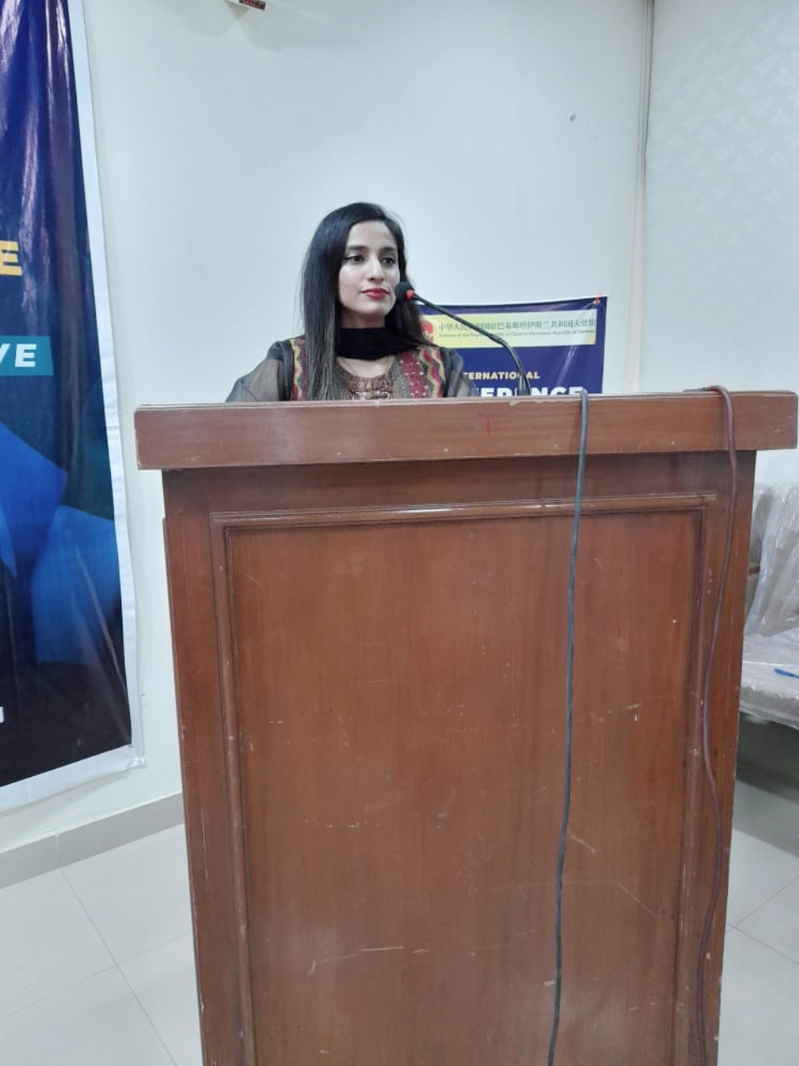
Ms. Maryam Raza, Deputy Director, Pakistan Research Center for a Community with Shared Future presented her speech in the session. She explained the key pillars of regional connectivity such as BRI, the idea of community with shared future, equality, trust and mutual assistance. She stated that BRI and the concept of community with shared future would facilitate the regional countries in tackling global issues and enhance collaboration in the region.
Other participants were as follows:
Prof. Dr. Farooq Ahmad Dar, Professor of History, Department of History QAU, Islamabad
Mr. Ghazi Muhammad Abdullah Professor, Department of History and Pakistan Studies, University of the Punjab, Lahore
Dr. Fakhar Bilal Assistant Professor, Department of History, Quaid-e-Azam University, Islamabad
Ms. Saira Ramzan Lecturer, Department of Archaeology, University of the Punjab, Lahore
Mr. Tian Xuefeng Ph. D Scholar, Department of History and Pakistan Studies, University of the Punjab,
Dr. Iram Naseer Assistant Professor, FC College University
Ms. Naila Rehman Ph. D Scholar, Department of History and Pakistan Studies, University of the Punjab, Lahore
The session was chaired by Prof. Dr. Muhammad Shafique, Chairman, Department of History, and Civilizations, BZ University, Multan. He also presented certificates to the distinguished speakers.
Reported by the PRCCSF
